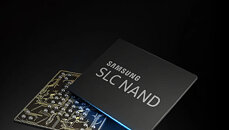
Intel "Jaguar Shores" Uses HBM4, "Diamond Rapids" Pairs with MRDIMM Gen 2 Memory
During the Intel AI Summit in Seoul, South Korea, Intel teased its upcoming product portfolio, featuring next-generation memory technologies. Being in Seoul, memory makers like SK Hynix are Intel's main partners for these products. Teased at the summit is Intel's upcoming AI accelerator, called "Jaguar Shores," which utilizes the next-generation HBM4 memory, offering 2.0 TB/s of bandwidth per module across 2,048 IO pins. SK Hynix plans to support this accelerator with its memory, ensuring that Intel's big data center-grade AI accelerator is equipped with the fastest memory on the market. Since the "Falcon Shores" accelerator is only intended for testing with external customers, we don't have an exact baseline to compare to, and Jaguar Shores specifications are scarce.
Next up, Intel confirmed that its upcoming seventh-generation "Diamond Rapids" Xeon processors will use the second generation of MRDIMMs (Multiplexer Rank Dual Inline Memory Modules), an upgrade from the first-generation MRDIMMs used in the Xeon 6 family. The upgrade to MRDIMMs Gen 2 will allow Intel to push transfer rates to 12,800 MT/s, up from 8,800 MT/s in Xeon 6 with MRDIMMs Gen 1. Alongside this 45% speed bump in raw transfer rates, the memory channels are jumping to 16, up from 12 in the current generation, yielding an additional bandwidth boost. Given that MRDIMMs operate by connecting more memory ranks using a multiplexer, and that these modules buffer data and commands, the increased data transfer rate comes without any additional signal degradation. As Intel is expected to pack more cores, this will be an essential piece in the toolbox to feed them and keep those cores busy on the Oak Stream platform, based on the LGA9324 socket.
Next up, Intel confirmed that its upcoming seventh-generation "Diamond Rapids" Xeon processors will use the second generation of MRDIMMs (Multiplexer Rank Dual Inline Memory Modules), an upgrade from the first-generation MRDIMMs used in the Xeon 6 family. The upgrade to MRDIMMs Gen 2 will allow Intel to push transfer rates to 12,800 MT/s, up from 8,800 MT/s in Xeon 6 with MRDIMMs Gen 1. Alongside this 45% speed bump in raw transfer rates, the memory channels are jumping to 16, up from 12 in the current generation, yielding an additional bandwidth boost. Given that MRDIMMs operate by connecting more memory ranks using a multiplexer, and that these modules buffer data and commands, the increased data transfer rate comes without any additional signal degradation. As Intel is expected to pack more cores, this will be an essential piece in the toolbox to feed them and keep those cores busy on the Oak Stream platform, based on the LGA9324 socket.





















































































